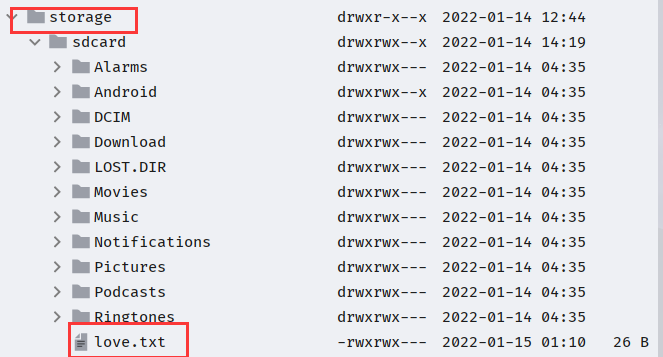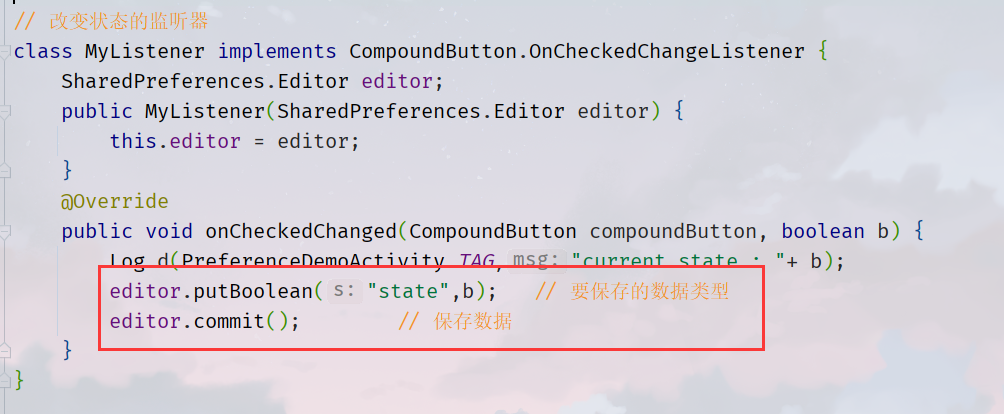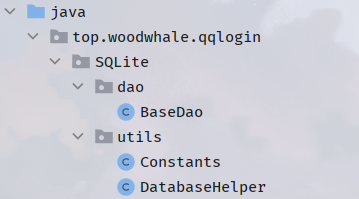【Android】安卓中的存储
这篇文章详细介绍了Android开发中存储数据的不同方式,包括在App内部存储、SD卡外部存储、使用SharedPreferences存储以及使用SQLite数据库存储。每种存储方式都有其特定的应用场景和优缺点。
在App内部存储:通常用于在App的
files文件夹中存储文件,也适用于在App的所有目录中读写文件。SD卡外部存储:虽然很多手机不再支持SD卡,但平板等设备仍可使用。使用
Environment.getExternalStorageDirectory()方法获取SD卡路径,并写入文件。使用SharedPreferences存储:用于存储简单的键值对,如用户偏好设置。使用
SharedPreferences类进行读写,常用于保存开关状态、用户设置等。使用SQLite数据库存储:Android设备自带SQLite数据库,提供了一套丰富的API进行数据库操作。包括自定义
DatabaseHelper类、BaseDao类进行增删改查操作,以及使用Google提供的API进行事务处理。
文章还展示了如何在AndroidTest包下进行数据库测试,并进行了事务的演示,展示了事务开启、执行、关闭的过程,以及事务中的回滚机制。
总的来说,文章提供了全面的Android存储解决方案,涵盖了从简单的键值对存储到复杂的数据库操作,并展示了如何在不同情况下选择适当的存储方式。
【Android】安卓中的存储
1、存储在App内部
最简单的一种。在尝试过程中发现,手机中很多文件夹都没有权限读写。我们可以将我们需要写的文件存放到App中的files文件夹中,当然我们有权限在整个App中读写文件

可以通过API获取一个file对象,这里的this就是MainActivity类
// 获取当前包下的files路径 /data/data/top.woodwhale.qqlogin/files
File filesDir = this.getFilesDir();
之后就可以通过文件输出流写入文件:
File filesFile = new File(filesDir,"info.txt");
boolean flag = (filesFile.exists() || filesFile.createNewFile());
FileOutputStream fos = new FileOutputStream(file);
fos.write((ac+"***"+pwd).getBytes(StandardCharsets.UTF_8));
fos.close();
写入成功:

当然,我们既然在这个App中都有权限,那么所有目录都可以写:
// 写入到自己有权限写的地方
File file = new File("/data/data/top.woodwhale.qqlogin/info.txt");
2、SD卡外部存储
虽然现在很多的手机都不支持SD卡了,但是仍然有平板使用。
直接放出一个Activity类,其中调用了nvironment.getExternalStorageDirectory();方法类获取一个sd卡file对象,使用Formatter.formatFileSize(this,externalStorageDirectory.getFreeSpace()));Formatter类中的转化,将long类型转化为大小类型,同时调用sd卡file对象的getFreeSpace()方法,获取卡中剩余的空间,之后就是写入externalStorageDirectory.getPath()卡中的路径
public class SdcardActivity extends Activity {
private Button btn;
public static String TAG = "SdcardActivity";
@Override
protected void onCreate(Bundle savedInstanceState) {
super.onCreate(savedInstanceState);
setContentView(R.layout.activity_sc_card_rw);
btn = this.findViewById(R.id.bt_sdw);
btn.setOnClickListener(view -> {
File externalStorageDirectory = Environment.getExternalStorageDirectory();
Log.d(TAG, "sd卡路径是:"+externalStorageDirectory.getPath());
Log.d(TAG,"sd卡剩余空间是"+ Formatter.formatFileSize(this,externalStorageDirectory.getFreeSpace()));
File file = new File(externalStorageDirectory,"love.txt");
try {
boolean flag = file.exists() || file.createNewFile();
if (flag) {
FileOutputStream fos = new FileOutputStream(file);
fos.write("woodwhale love sheepbotany".getBytes(StandardCharsets.UTF_8));
fos.close();
}
} catch (Exception e) {
e.printStackTrace();
}
});
}
}
但是,在此之前,我们需要一个SD卡的读写权限,我们在AndrodiManifest.xml中配置下面的ses-permission
<uses-permission android:name="android.permission.WRITE_EXTERNAL_STORAGE"/>
<uses-permission android:name="android.permission.READ_EXTERNAL_STORAGE"/>
最终,在我们的sd卡中看到如下结果,证明写入成功:

3、SharedPreferences存储
SharedPreferences是android下的一个类,功能就是记录偏好设置,形成一个xml文件
我们可以用SharedPreferences来存储一些信息。
例如常见的这种:

我们勾选之后,再次打开app仍然处于勾选状态。
那么这种情况如何实现呢?
通过xml生成上面的布局
<?xml version="1.0" encoding="utf-8"?>
<RelativeLayout xmlns:android="http://schemas.android.com/apk/res/android"
android:layout_width="match_parent"
android:layout_height="80dp">
<LinearLayout
android:layout_width="match_parent"
android:layout_height="match_parent"
android:orientation="vertical"
android:layout_centerVertical="true">
<TextView
android:layout_width="wrap_content"
android:layout_height="wrap_content"
android:text="未知来源"
android:textColor="@color/teal_200"
android:layout_marginLeft="10dp"
android:textSize="20sp" />
<TextView
android:layout_width="wrap_content"
android:layout_height="wrap_content"
android:text="运行安装未知来源的应用"
android:layout_marginLeft="10dp"
android:layout_marginTop="10dp"
android:textSize="18sp"/>
</LinearLayout>
<Switch
android:id="@+id/sw_source"
android:layout_width="wrap_content"
android:layout_height="wrap_content"
android:layout_alignParentRight="true"
android:layout_marginTop="30dp"
android:layout_marginRight="10dp" />
</RelativeLayout>
我们把Switch这个选择框在activity类中赋予一个变量,给他加上一个OnCheckedChangeListener,再使用SharedPreferences来进行设置偏好,整体代码如下
package top.woodwhale.qqlogin;
import android.app.Activity;
import android.content.SharedPreferences;
import android.os.Bundle;
import android.util.Log;
import android.widget.CompoundButton;
import android.widget.Switch;
import androidx.annotation.Nullable;
public class PreferenceDemoActivity extends Activity {
private Switch sw;
public static String TAG = "PreferenceDemoActivity";
@Override
protected void onCreate(@Nullable Bundle savedInstanceState) {
super.onCreate(savedInstanceState);
setContentView(R.layout.activity_pre_demo);
sw = (Switch) this.findViewById(R.id.sw_source);
SharedPreferences settingInfo = this.getSharedPreferences("settingInfo", MODE_PRIVATE);
SharedPreferences.Editor edit = settingInfo.edit();
sw.setOnCheckedChangeListener(new MyListener(edit));
boolean state = settingInfo.getBoolean("state", true);
Log.d(TAG,"STATE=="+ state);
sw.setChecked(state);
}
}
// 改变状态的监听器
class MyListener implements CompoundButton.OnCheckedChangeListener {
SharedPreferences.Editor editor;
public MyListener(SharedPreferences.Editor editor) {
this.editor = editor;
}
@Override
public void onCheckedChanged(CompoundButton compoundButton, boolean b) {
Log.d(PreferenceDemoActivity.TAG,"current state : "+ b);
editor.putBoolean("state",b); // 要保存的数据类型
editor.commit(); // 保存数据
}
}
其中,editor的功能是保存数据

其次,为了每次打开App都可以看到我们的配置,通过读取偏好配置文件,设置switch框的勾选

这样就可以同步偏好设置的勾选啦!
最后我们可以在手机内部看到我们写入的偏好设置xml文件了,这样也属于存储在App内部


4、使用SQLite数据库存储
Android设备自带SQLite数据库,如果掌握过mysql,那么SQLite非常容易上手,且不说提供了非常简便的API,就算是自己写也比JDBC简单!
首先我们不适用提供的API来实现一次增删改查!
4.1 自己完成一个BaseDao类
BaseDao类本来是用来连接数据库等基础的,具体的增删改查应该在service层实现,但为了这里测试,我们将crud的方法写入到BaseDao类中封装起来。具体架构如下:

首先是Constants类,是常量类,其中有我们的数据库名、版本号、表名
public class Constants {
public static final String DATABASE_NAME = "woodwhale.db";
public static final int VERSION_CODE = 1;
public static final String TABLE_NAME = "user";
}
其次是DatabaseHelper类,继承SQLiteOpenHelper类,用来开启数据库,其中的onCreate方法是数据库创建时的回调,onUpgrade方法时升级数据时的回调,我们在Constans类中写了一个版本号,爸爸那边每次升级可以加入新的功能,可以写在onUpgrade方法中,通过switch实现。不过需要注意,升级只能让版本号上升,不能降级,否则会报错!
package top.woodwhale.qqlogin.SQLite.utils;
import android.content.Context;
import android.database.sqlite.SQLiteDatabase;
import android.database.sqlite.SQLiteOpenHelper;
import android.util.Log;
public class DatabaseHelper extends SQLiteOpenHelper {
public static String TAG = "DatabaseHelper";
/**
* @param context 上下文
*/
public DatabaseHelper( Context context) {
super(context, Constants.DATABASE_NAME, null, Constants.VERSION_CODE);
}
@Override
public void onCreate(SQLiteDatabase sqLiteDatabase) {
// 创建时的回调
Log.d(TAG, "创建数据库");
String sql = "create table " + Constants.TABLE_NAME + " (id integer,name varchar,age integer)";
sqLiteDatabase.execSQL(sql);
}
@Override
public void onUpgrade(SQLiteDatabase sqLiteDatabase, int i, int i1) {
// 升级数据库的回调
Log.d(TAG, "升级数据库!");
String sql = null;
switch (i) {
case 1:
sql = "alter table "+ Constants.TABLE_NAME + " add phone integer";
sqLiteDatabase.execSQL(sql);
break;
case 2:
sql = "alter table "+ Constants.TABLE_NAME + " add address varchar";
sqLiteDatabase.execSQL(sql);
break;
}
}
}
最后就是我们封装好的数据库BaseDao类,通过语句实现了增删改查
package top.woodwhale.qqlogin.SQLite.dao;
import android.annotation.SuppressLint;
import android.content.Context;
import android.database.Cursor;
import android.database.sqlite.SQLiteDatabase;
import android.util.Log;
import top.woodwhale.qqlogin.SQLite.utils.Constants;
import top.woodwhale.qqlogin.SQLite.utils.DatabaseHelper;
// BaseDao类
public class BaseDao {
private final DatabaseHelper dbh;
private SQLiteDatabase db;
public static String TAG = "BaseDao";
public BaseDao(Context context) {
dbh = new DatabaseHelper(context);
}
// 增
public void add(int id, String name, int age) {
db = dbh.getWritableDatabase();
String sql = "insert into " + Constants.TABLE_NAME + "(id,name,age) values(?,?,?)";
Object[] params = new Object[]{id,name,age};
db.execSQL(sql,params);
db.close();
}
// 删
public void free(int id) {
db = dbh.getWritableDatabase();
String sql = "delete from " + Constants.TABLE_NAME + " where id=?";
Object[] params = new Object[]{id};
db.execSQL(sql,params);
db.close();
}
// 改
public void edit(int id, int age) {
db = dbh.getWritableDatabase();
String sql = "update " + Constants.TABLE_NAME +" set age = ? where id = ?";
Object[] params = new Object[]{age,id};
db.execSQL(sql,params);
db.close();
}
// 查
@SuppressLint("Range")
public void show(int id) {
db = dbh.getReadableDatabase();
String sql = "select * from " + Constants.TABLE_NAME +" where id = ?";
String[] params = new String[]{String.valueOf(id)};
Cursor cursor = db.rawQuery(sql, params);
while (cursor.moveToNext()) {
String name = cursor.getString(cursor.getColumnIndex("name"));
Log.d(TAG,"name == "+name);
int age = cursor.getInt(cursor.getColumnIndex("age"));
Log.d(TAG,"age == "+age);
}
cursor.close();
db.close();
}
}
接着我们在AndroidTest包下进行测试

package top.woodwhale.qqlogin;
import android.content.Context;
import android.database.sqlite.SQLiteDatabase;
import android.util.Log;
import androidx.test.platform.app.InstrumentationRegistry;
import androidx.test.ext.junit.runners.AndroidJUnit4;
import org.junit.Test;
import org.junit.runner.RunWith;
import static org.junit.Assert.*;
import top.woodwhale.qqlogin.SQLite.dao.BaseDao;
import top.woodwhale.qqlogin.SQLite.utils.DatabaseHelper;
/**
* Instrumented test, which will execute on an Android device.
*
* @see <a href="http://d.android.com/tools/testing">Testing documentation</a>
*/
@RunWith(AndroidJUnit4.class)
public class ExampleInstrumentedTest {
public static final String TAG = "ExampleInstrumentedTest";
public static final Context appContext = InstrumentationRegistry.getInstrumentation().getTargetContext();;
public static final BaseDao dao = new BaseDao(appContext);;
@Test
public void useAppContext() {
// Context of the app under test.
assertEquals("top.woodwhale.qqlogin", appContext.getPackageName());
}
@Test
public void testCreate() {
DatabaseHelper dbh = new DatabaseHelper(appContext);
SQLiteDatabase writableDatabase = dbh.getWritableDatabase();
Log.d(TAG, writableDatabase.getPath());
}
@Test
public void testAdd() {
dao.add(1,"woodwhale",19);
dao.add(2,"sheepbotany",21);
}
@Test
public void testFree() {
dao.free(1);
}
@Test
public void testEdit() {
dao.edit(1,3);
}
@Test
public void testShow() {
dao.show(1);
}
}
增删改查都成功,成功就如图所示:

由于只有查询有log回显,在logcat中之后show方法出现了log

4.2 使用Google写的API处理
那么使用Google写好的增删改查api可以避免我们sql语句的格式问题和语法错误
经过测试,如下代码没有问题(在BaseDao类中)
// 使用API的添加
public void addByAPI(int id, String name, int age) {
ContentValues contentValues = new ContentValues();
contentValues.put("id",id);
contentValues.put("name",name);
contentValues.put("age",age);
db = dbh.getWritableDatabase();
db.insert(Constants.TABLE_NAME,null,contentValues);
db.close();
}
// 删除
public void freeByAPI(int id) {
db = dbh.getWritableDatabase();
db.delete(Constants.TABLE_NAME,"id = ?",new String[]{String.valueOf(id)});
db.close();
Log.d(TAG,"API删除成功!");
}
// 修改
public void editByAPI(int id, String name, Integer age) {
ContentValues contentValues = new ContentValues();
if (name != null) {
contentValues.put("name",name);
}
if (age != null) {
contentValues.put("age",age);
}
db = dbh.getWritableDatabase();
db.update(Constants.TABLE_NAME,contentValues,"id = ?", new String[]{String.valueOf(id)});
db.close();
}
// 查询
public void showByAPI(int id) {
db = dbh.getReadableDatabase();
Cursor cursor = db.query(false, Constants.TABLE_NAME, new String[]{"id", "name", "age"}, "id = ?", new String[]{String.valueOf(id)}, "id", null, null, null);
while (cursor.moveToNext()) {
int ID = cursor.getInt(0);
Log.d(TAG,"ID == "+ID);
String name = cursor.getString(1);
Log.d(TAG,"name == "+name);
int age = cursor.getInt(2);
Log.d(TAG,"age == "+age);
}
cursor.close();
db.close();
}
4.3 事务使用
使用db.beginTransaction(); db.setTransactionSuccessful(); db.endTransaction();三个方法来进行事务的处理。
简单的一个测试类
// 测试一个数据库事物
@Test
public void testTransaction() {
DatabaseHelper dbh = new DatabaseHelper(appContext);
SQLiteDatabase db = dbh.getWritableDatabase();
db.beginTransaction();
Log.d(TAG,"事物开启!");
try {
db.execSQL("update " + Constants.TABLE_NAME +" set age = 114 where id = 1");
int i = 10 / 0;
db.execSQL("update " + Constants.TABLE_NAME +" set age = 114 where id = 2");
db.setTransactionSuccessful();
Log.d(TAG,"事物成功!");
} catch (Exception e) {
e.printStackTrace();
} finally {
db.endTransaction();
db.close();
Log.d(TAG,"事物关闭!");
}
dao.showByAPI(1);
dao.showByAPI(2);
}
看看logcat,首先是进入了 事物开启,然后程序进入了try中,因为除以了一个0所以报错,捕获异常了之后就是进入到finally中关闭了事务,可以发现我们sql中的信息都回滚了,没有改变。

我们把int i = 10 / 0;删了试一试,可以看到成功执行事物。

值得注意的是,事物开启之后,仅有当前的db对象可以执行sql语句,使用Dao类中的方法是无法进行增删改查的,因为对这些得到的db对象上了锁!